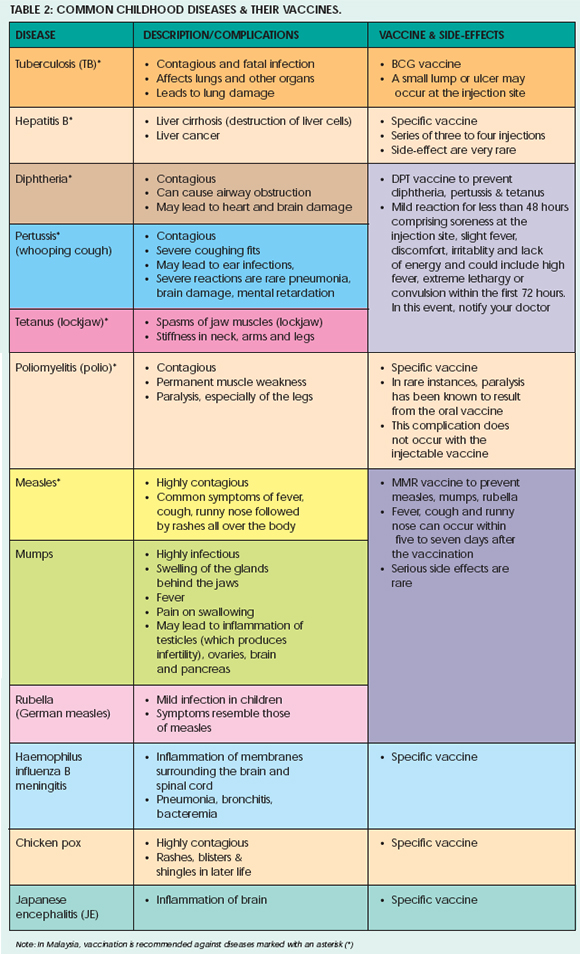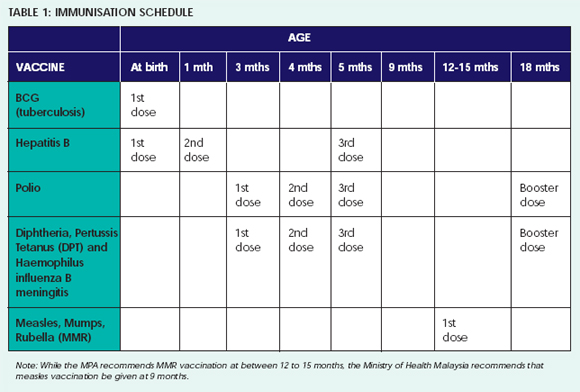There is a war going in your child’s body. From even before he is born, he is threatened by a host of unseen enemies in the form of viruses and bacteria. As a result, his immune system is kept busy seeking out and destroying these microorganisms before they can multiply enough to cause serious harm.
There are times when your child’s defenses might temporarily succumb to the would-be invaders. However, his immune system will typically send in more reinforcements.
In many cases, they will eventually overcome the infections. The reward that comes with hard-earned victory is a complex immunological ‘memory’ – which we call ‘immunity’ – to prevent future invasions by the same germs. Unfortunately, not all micro-organisms are created equal. Some can be vanquished by your child’s immune system. Then, there are those that are more than a deadly match for it.
PREVENTING INVASIONS
Hepatitis B, poliomyelitis, measles, mumps and rubella are diseases caused by viruses. Tuberculosis, haemophilus influenza B (HIB), pertussis (whooping cough), diphtheria and tetanus are bacterial in origin.
All have to be taken seriously. They are common and can cause considerable disability or even death in infants and young children. Just as important to note, there is no effective or specific treatments for many of these diseases.
As yet, there are hardly any drugs to successfully combat those viral diseases. When complications arise, there is little left except to put the children on supportive treatment that can be unpleasant and expensive (eg mechanical ventilation, anti-viral medication and gamma globulin, and anti-convulsants).
Antibiotics are administered for the bacterial infections but treatment tends to be prolonged (eg lasting at least 6 months for tuberculosis). As is often the case with pertussis, there is also the risk of being too late with treatment to reduce the severity or duration of the disease. At times, treatment may not be able to prevent severe complications from occurring (like heart or brain damage resulting from diphtheria; or muscular paralysis from tetanus).
You could be making a big mistake to imagine that such serious diseases couldn’t possibly occur to your child or that they can easily be treated. Instead, it will be more prudent to prevent them in the first place.
This is why parents are advised to have their children vaccinated. It’s an infinitely wiser, less painful and cheaper alternative to taking a chance with an innocent life.
Vaccines are remarkably safe and effective, although some children occasionally experience minor reactions to them. Most vaccines are given by injection, although a few are taken orally.
Vaccines contain micro-organisms that have been killed or weakened, or just part of their protein coat. When your child is vaccinated, his body will be stimulated to produce antibodies that can protect him against infection should he ever get in contact with the virus or bacteria again.
Different diseases require different vaccines (see Table 2). Parents are strongly urged to have their children vaccinated, using the government’s immunisation programme as a guide.

Many vaccines require more than one dose before full immunity is acquired. Thus, it is important that your child is vaccinated on schedule (see Table 1).

The thought of making repeated visits to the clinic or hospital may make you cringe. After all, handling a child who is old enough to fear injections can make it most stressful affair. Here are some tips on how you can make it easier for him and yourself.
HELPING YOUR CHILD TO COPE
- Never try to fool your child. Tell him in advance that he will be getting a shot, so that he will be prepared for the event. Nevertheless, there is no need to tell him a week in advance, because it will be hanging over his head like a dark cloud the whole time. Tell him on the day of the appointment itself, or just outside the doctor’s office.
- Children generally do better when they know what’s going to happen. So tell your child what the doctor is going to do when giving the shot. Don’t lie to your child by saying that it won’t hurt. Instead, tell him that it will hurt just a little, but that he has to be brave so that he will stay healthy.
- Do your part when the doctor is administering the shot. Distract your child by talking to him, singing with him, or counting aloud with him. Before you know it, it will be over. Then, praise your child for being so brave and console him if he is feeling any pain.
POINTERS FOR PARENTS
- Before doing it for the first time, talk to those who have done it before. Your parents, friends or neighbours will probably be able to offer some proven and practical advice on what to expect and how to weather the situation.
- Make your child’s vaccination a routine affair. Put up a schedule in the kitchen or somewhere visible, and let your spouse or someone else know about it. Chances are, they’ll remind you if you forget an appointment.
- Let your employer know well before hand as to when you will need to attend to your child. Arrange to take time off, if necessary.
- If your schedule doesn’t allow flexibility, have your spouse or relative take your child to the doctor.
- Don’t get overly anxious if some delay occurs. It may not interfere with the final immunity achieved or entail starting all the way from the beginning.







Comments